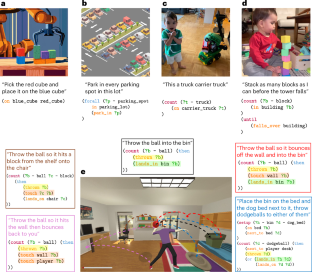Goals as reward-producing programs
IF 23.9
1区 计算机科学
Q1 COMPUTER SCIENCE, ARTIFICIAL INTELLIGENCE
引用次数: 0
Abstract
People are remarkably capable of generating their own goals, beginning with child’s play and continuing into adulthood. Despite considerable empirical and computational work on goals and goal-oriented behaviour, models are still far from capturing the richness of everyday human goals. Here we bridge this gap by collecting a dataset of human-generated playful goals (in the form of scorable, single-player games), modelling them as reward-producing programs and generating novel human-like goals through program synthesis. Reward-producing programs capture the rich semantics of goals through symbolic operations that compose, add temporal constraints and allow program execution on behavioural traces to evaluate progress. To build a generative model of goals, we learn a fitness function over the infinite set of possible goal programs and sample novel goals with a quality-diversity algorithm. Human evaluators found that model-generated goals, when sampled from partitions of program space occupied by human examples, were indistinguishable from human-created games. We also discovered that our model’s internal fitness scores predict games that are evaluated as more fun to play and more human-like. To enable artificial agents to generate human-like goals, a model must capture the complexity and diversity of human goals. Davidson et al. model playful goals from a naturalistic experiment as reward-producing programs, mapping an agent’s behaviour to goal success. They then develop a computational model to generate diverse human-like goals.


目标是产生奖励的程序
人们非常有能力创造自己的目标,从孩子的游戏开始,一直持续到成年。尽管在目标和目标导向行为方面进行了大量的经验和计算工作,但模型仍然远远不能捕捉到人类日常目标的丰富性。在这里,我们通过收集人类生成的有趣目标(以可得分的单人游戏的形式)的数据集,将其建模为产生奖励的程序,并通过程序合成生成新的类似人类的目标,来弥合这一差距。产生奖励的程序通过符号操作捕获目标的丰富语义,这些符号操作组成、添加时间约束,并允许程序在行为痕迹上执行,以评估进度。为了建立目标的生成模型,我们在无限可能的目标规划集上学习一个适应度函数,并使用质量多样性算法对新目标进行采样。人类评估人员发现,当从人类示例占用的程序空间分区中采样时,模型生成的目标与人类创建的游戏无法区分。我们还发现,我们的模型的内部健康分数预测的游戏被评估为更有趣,更像人类。
本文章由计算机程序翻译,如有差异,请以英文原文为准。
求助全文
约1分钟内获得全文
求助全文
来源期刊

Nature Machine Intelligence
Multiple-
CiteScore
36.90
自引率
2.10%
发文量
127
期刊介绍:
Nature Machine Intelligence is a distinguished publication that presents original research and reviews on various topics in machine learning, robotics, and AI. Our focus extends beyond these fields, exploring their profound impact on other scientific disciplines, as well as societal and industrial aspects. We recognize limitless possibilities wherein machine intelligence can augment human capabilities and knowledge in domains like scientific exploration, healthcare, medical diagnostics, and the creation of safe and sustainable cities, transportation, and agriculture. Simultaneously, we acknowledge the emergence of ethical, social, and legal concerns due to the rapid pace of advancements.
To foster interdisciplinary discussions on these far-reaching implications, Nature Machine Intelligence serves as a platform for dialogue facilitated through Comments, News Features, News & Views articles, and Correspondence. Our goal is to encourage a comprehensive examination of these subjects.
Similar to all Nature-branded journals, Nature Machine Intelligence operates under the guidance of a team of skilled editors. We adhere to a fair and rigorous peer-review process, ensuring high standards of copy-editing and production, swift publication, and editorial independence.
 求助内容:
求助内容: 应助结果提醒方式:
应助结果提醒方式:


